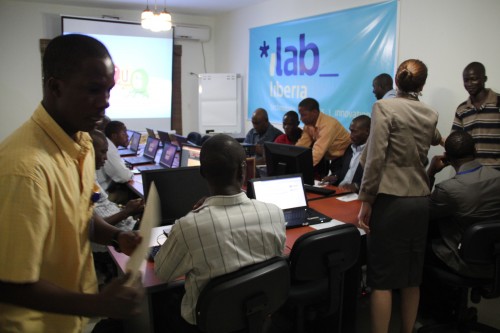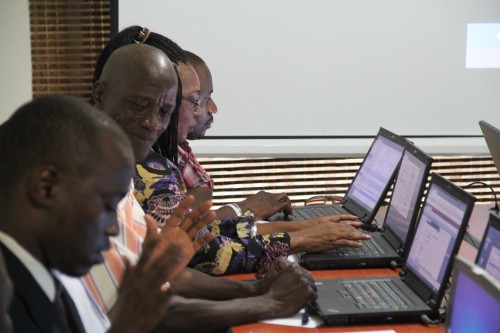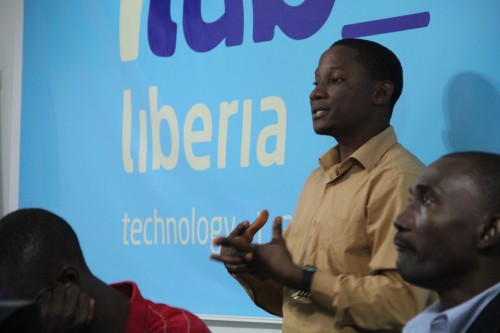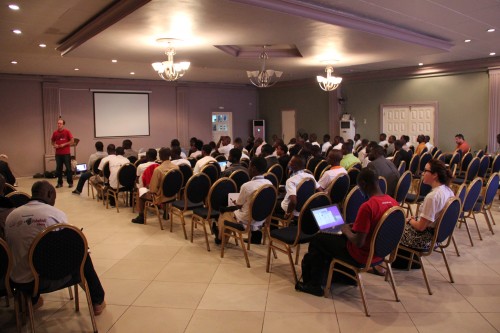iLab Liberia was bustling last week with Ushahidi Liberia and Google’s event, “New Tech at Work: Planning for Liberia’s Elections and Beyond.” The event was broken into two sections – a two-day session at iLab and a public one-day session at the delicious and spacious PA’s Ribhouse (good bbq and a big hall – what else is there?). Here’s a bit about what we covered and how it went.
The idea behind these events was 1. share tools for data management (storage, curation and web interface) and with Liberia’s leading IT specialists and election monitors ahead of the referendum and presidential election and 2. to introduce Liberians to a variety of freely available online tools that can serve as megaphones – ways to grow Liberia’s online presence at a critical time in its history when so many Liberians want to encourage a democratic election at home but may not know how many tools are out there for sharing their perspectives locally and abroad.
[caption id="attachment_4482" align="aligncenter" width="500" caption="IT officers and election monitors get settled in for a full day of data management tool talk"] [/caption]
The participants for the first two-day event at iLab included IT officers and GIS specialists from the National Elections Commission, Liberia’s GIS Institute, election-related iNGOs such as NDI and IFES, and the Elections Coordinating Committee that represents more than 20 NGOs. According to interviews conducted with each participating organization, many of the inefficiencies that currently exist can be traced back to poor data storage, inconsistent formatting and outdated websites with a non-intuitive user interface.
[caption id="attachment_4483" align="aligncenter" width="500" caption="Participants at iLab going through tutorial in how to use Google Sites"]
[/caption]
The participants for the first two-day event at iLab included IT officers and GIS specialists from the National Elections Commission, Liberia’s GIS Institute, election-related iNGOs such as NDI and IFES, and the Elections Coordinating Committee that represents more than 20 NGOs. According to interviews conducted with each participating organization, many of the inefficiencies that currently exist can be traced back to poor data storage, inconsistent formatting and outdated websites with a non-intuitive user interface.
[caption id="attachment_4483" align="aligncenter" width="500" caption="Participants at iLab going through tutorial in how to use Google Sites"] [/caption]
Our sessions were full of lively discussion and it was clear what tools and topics resonated most with participants: some include Dropbox for file sharing, Google sites using online Forms to simplify data entry with election data, Skype for remotely viewing other person’s screen during conversation, and internal wikis. We also went off-topic a bit to offer some solutions to perennial problems like corrupted USB sticks infecting computers; Kpetermeni Siakor offered a tutorial in how to recover files seemingly lost forever when a corrupted USB stick takes over – you should have heard the eruptions of applause when these tricks were revealed! The topics of these sessions may sound droll – data management doesn’t exactly give most people goosebumps – but it is where so much of the rich data collected during this election process gets stalled and improperly – if ever – shared. As one of the Elections Coordinating Committee’s IT officers said, “How you enter [data] is the kind of analysis you will get out of it”, and everyone in attendance was ready to get more out of their data. John Etherton joined the Ushahidi Liberia and Google team for the events, and led most of the data management sessions; as I watched from the back of the room, I could see National Elections Commission and NDI participants pulling up their own data on the screen and standardizing data formats as John spoke, following his suggestions and cleaning up scores of spreadsheets. Now again that may not elicit goosebumps for most, but I have to say it was thrilling to see changes happening in real-time that may significantly improve data storage and collaboration between these leading institutions for Liberia’s election.
[caption id="attachment_4484" align="aligncenter" width="500" caption="Carter presents on data curation techniques"]
[/caption]
Our sessions were full of lively discussion and it was clear what tools and topics resonated most with participants: some include Dropbox for file sharing, Google sites using online Forms to simplify data entry with election data, Skype for remotely viewing other person’s screen during conversation, and internal wikis. We also went off-topic a bit to offer some solutions to perennial problems like corrupted USB sticks infecting computers; Kpetermeni Siakor offered a tutorial in how to recover files seemingly lost forever when a corrupted USB stick takes over – you should have heard the eruptions of applause when these tricks were revealed! The topics of these sessions may sound droll – data management doesn’t exactly give most people goosebumps – but it is where so much of the rich data collected during this election process gets stalled and improperly – if ever – shared. As one of the Elections Coordinating Committee’s IT officers said, “How you enter [data] is the kind of analysis you will get out of it”, and everyone in attendance was ready to get more out of their data. John Etherton joined the Ushahidi Liberia and Google team for the events, and led most of the data management sessions; as I watched from the back of the room, I could see National Elections Commission and NDI participants pulling up their own data on the screen and standardizing data formats as John spoke, following his suggestions and cleaning up scores of spreadsheets. Now again that may not elicit goosebumps for most, but I have to say it was thrilling to see changes happening in real-time that may significantly improve data storage and collaboration between these leading institutions for Liberia’s election.
[caption id="attachment_4484" align="aligncenter" width="500" caption="Carter presents on data curation techniques"] [/caption]
The third day – our public event – focused on free online tools that can be used to monitor the electoral process and increase citizens’ engagement within and outside of Liberia. We weren’t sure how many people would attend; we’d sent out fliers, advertised in the paper, but we knew the tech community is small and the event’s focus was fairly specific. Much to our delight, nearly 100 people showed up and were very engaged in the presentations and the breakout sessions. Some of the tools presented were FrontlineSMS, Twitter, Blogger, Google Map Maker and Ushahidi; we also had very exciting breakout sessions on Google’s app engine, FOSS and its applications, setting up virtual box as a way to transition from Microsoft to FOSS, mapping for social change (led by Ushahidi's Patrick Meier!), and file sharing via router without internet.
[caption id="attachment_4485" align="aligncenter" width="500" caption="Ushahidi's own Patrick Meier was present at the week's events and shared some insights about mapping for social change"]
[/caption]
The third day – our public event – focused on free online tools that can be used to monitor the electoral process and increase citizens’ engagement within and outside of Liberia. We weren’t sure how many people would attend; we’d sent out fliers, advertised in the paper, but we knew the tech community is small and the event’s focus was fairly specific. Much to our delight, nearly 100 people showed up and were very engaged in the presentations and the breakout sessions. Some of the tools presented were FrontlineSMS, Twitter, Blogger, Google Map Maker and Ushahidi; we also had very exciting breakout sessions on Google’s app engine, FOSS and its applications, setting up virtual box as a way to transition from Microsoft to FOSS, mapping for social change (led by Ushahidi's Patrick Meier!), and file sharing via router without internet.
[caption id="attachment_4485" align="aligncenter" width="500" caption="Ushahidi's own Patrick Meier was present at the week's events and shared some insights about mapping for social change"] [/caption]
With this larger audience, we wanted to drive home the role of social media in promoting a democratic election where the concept alone is still new and the process fragile. It was interesting to see what excited this audience the most; FrontlineSMS was a big hit as a way to send SMS blasts regarding important election info, the Ushahidi instance for Liberia’s election generated a lot of interest, and Map Maker both revealed the paucity of detail on Liberia’s maps and generated excitement about applying local knowledge to grow those maps. Interestingly, Twitter did not immediately appeal to the audience – in a country where texting is still new and computer access is less than 5%, tweeting seems like a lot of effort without clear advantages. But Twitter’s new SMS feature would make this a much more popular tool in Liberia; we’re following up on this with local operators and Twitter to make the tool more useful and accessible in Liberia.
Another interesting note: Luther Jeke of Ushahidi Liberia presented Facebook Groups as a social organizing tool around the elections and most of the questions generated by this presentation were about the security of the groups- whether or not a group could be overtaken by a rogue member. Again, a reasonable question in a country recovering from civil war and still not convinced that any tool used to connect and organize people is secure; more often, each new approach to information sharing (even switching from the popular Yahoo email account to Gmail) is usually met with concerns about security. This is an important element to the adoption of these various tools, and one that our team now realizes we have to consider more seriously in future trainings and assumptions about what stands in the way of IT working in Liberia.
It was a whirlwind of a week, and we were so grateful to work with Google on these events. As we continue to receive feedback on these sessions and create follow-up trainings at iLab, we’ll provide updates – and we welcome your thoughts on any of what we’ve shared including your experiences introducing these tools in similar contexts.
[/caption]
With this larger audience, we wanted to drive home the role of social media in promoting a democratic election where the concept alone is still new and the process fragile. It was interesting to see what excited this audience the most; FrontlineSMS was a big hit as a way to send SMS blasts regarding important election info, the Ushahidi instance for Liberia’s election generated a lot of interest, and Map Maker both revealed the paucity of detail on Liberia’s maps and generated excitement about applying local knowledge to grow those maps. Interestingly, Twitter did not immediately appeal to the audience – in a country where texting is still new and computer access is less than 5%, tweeting seems like a lot of effort without clear advantages. But Twitter’s new SMS feature would make this a much more popular tool in Liberia; we’re following up on this with local operators and Twitter to make the tool more useful and accessible in Liberia.
Another interesting note: Luther Jeke of Ushahidi Liberia presented Facebook Groups as a social organizing tool around the elections and most of the questions generated by this presentation were about the security of the groups- whether or not a group could be overtaken by a rogue member. Again, a reasonable question in a country recovering from civil war and still not convinced that any tool used to connect and organize people is secure; more often, each new approach to information sharing (even switching from the popular Yahoo email account to Gmail) is usually met with concerns about security. This is an important element to the adoption of these various tools, and one that our team now realizes we have to consider more seriously in future trainings and assumptions about what stands in the way of IT working in Liberia.
It was a whirlwind of a week, and we were so grateful to work with Google on these events. As we continue to receive feedback on these sessions and create follow-up trainings at iLab, we’ll provide updates – and we welcome your thoughts on any of what we’ve shared including your experiences introducing these tools in similar contexts.
 [/caption]
The participants for the first two-day event at iLab included IT officers and GIS specialists from the National Elections Commission, Liberia’s GIS Institute, election-related iNGOs such as NDI and IFES, and the Elections Coordinating Committee that represents more than 20 NGOs. According to interviews conducted with each participating organization, many of the inefficiencies that currently exist can be traced back to poor data storage, inconsistent formatting and outdated websites with a non-intuitive user interface.
[caption id="attachment_4483" align="aligncenter" width="500" caption="Participants at iLab going through tutorial in how to use Google Sites"]
[/caption]
The participants for the first two-day event at iLab included IT officers and GIS specialists from the National Elections Commission, Liberia’s GIS Institute, election-related iNGOs such as NDI and IFES, and the Elections Coordinating Committee that represents more than 20 NGOs. According to interviews conducted with each participating organization, many of the inefficiencies that currently exist can be traced back to poor data storage, inconsistent formatting and outdated websites with a non-intuitive user interface.
[caption id="attachment_4483" align="aligncenter" width="500" caption="Participants at iLab going through tutorial in how to use Google Sites"] [/caption]
Our sessions were full of lively discussion and it was clear what tools and topics resonated most with participants: some include Dropbox for file sharing, Google sites using online Forms to simplify data entry with election data, Skype for remotely viewing other person’s screen during conversation, and internal wikis. We also went off-topic a bit to offer some solutions to perennial problems like corrupted USB sticks infecting computers; Kpetermeni Siakor offered a tutorial in how to recover files seemingly lost forever when a corrupted USB stick takes over – you should have heard the eruptions of applause when these tricks were revealed! The topics of these sessions may sound droll – data management doesn’t exactly give most people goosebumps – but it is where so much of the rich data collected during this election process gets stalled and improperly – if ever – shared. As one of the Elections Coordinating Committee’s IT officers said, “How you enter [data] is the kind of analysis you will get out of it”, and everyone in attendance was ready to get more out of their data. John Etherton joined the Ushahidi Liberia and Google team for the events, and led most of the data management sessions; as I watched from the back of the room, I could see National Elections Commission and NDI participants pulling up their own data on the screen and standardizing data formats as John spoke, following his suggestions and cleaning up scores of spreadsheets. Now again that may not elicit goosebumps for most, but I have to say it was thrilling to see changes happening in real-time that may significantly improve data storage and collaboration between these leading institutions for Liberia’s election.
[caption id="attachment_4484" align="aligncenter" width="500" caption="Carter presents on data curation techniques"]
[/caption]
Our sessions were full of lively discussion and it was clear what tools and topics resonated most with participants: some include Dropbox for file sharing, Google sites using online Forms to simplify data entry with election data, Skype for remotely viewing other person’s screen during conversation, and internal wikis. We also went off-topic a bit to offer some solutions to perennial problems like corrupted USB sticks infecting computers; Kpetermeni Siakor offered a tutorial in how to recover files seemingly lost forever when a corrupted USB stick takes over – you should have heard the eruptions of applause when these tricks were revealed! The topics of these sessions may sound droll – data management doesn’t exactly give most people goosebumps – but it is where so much of the rich data collected during this election process gets stalled and improperly – if ever – shared. As one of the Elections Coordinating Committee’s IT officers said, “How you enter [data] is the kind of analysis you will get out of it”, and everyone in attendance was ready to get more out of their data. John Etherton joined the Ushahidi Liberia and Google team for the events, and led most of the data management sessions; as I watched from the back of the room, I could see National Elections Commission and NDI participants pulling up their own data on the screen and standardizing data formats as John spoke, following his suggestions and cleaning up scores of spreadsheets. Now again that may not elicit goosebumps for most, but I have to say it was thrilling to see changes happening in real-time that may significantly improve data storage and collaboration between these leading institutions for Liberia’s election.
[caption id="attachment_4484" align="aligncenter" width="500" caption="Carter presents on data curation techniques"] [/caption]
The third day – our public event – focused on free online tools that can be used to monitor the electoral process and increase citizens’ engagement within and outside of Liberia. We weren’t sure how many people would attend; we’d sent out fliers, advertised in the paper, but we knew the tech community is small and the event’s focus was fairly specific. Much to our delight, nearly 100 people showed up and were very engaged in the presentations and the breakout sessions. Some of the tools presented were FrontlineSMS, Twitter, Blogger, Google Map Maker and Ushahidi; we also had very exciting breakout sessions on Google’s app engine, FOSS and its applications, setting up virtual box as a way to transition from Microsoft to FOSS, mapping for social change (led by Ushahidi's Patrick Meier!), and file sharing via router without internet.
[caption id="attachment_4485" align="aligncenter" width="500" caption="Ushahidi's own Patrick Meier was present at the week's events and shared some insights about mapping for social change"]
[/caption]
The third day – our public event – focused on free online tools that can be used to monitor the electoral process and increase citizens’ engagement within and outside of Liberia. We weren’t sure how many people would attend; we’d sent out fliers, advertised in the paper, but we knew the tech community is small and the event’s focus was fairly specific. Much to our delight, nearly 100 people showed up and were very engaged in the presentations and the breakout sessions. Some of the tools presented were FrontlineSMS, Twitter, Blogger, Google Map Maker and Ushahidi; we also had very exciting breakout sessions on Google’s app engine, FOSS and its applications, setting up virtual box as a way to transition from Microsoft to FOSS, mapping for social change (led by Ushahidi's Patrick Meier!), and file sharing via router without internet.
[caption id="attachment_4485" align="aligncenter" width="500" caption="Ushahidi's own Patrick Meier was present at the week's events and shared some insights about mapping for social change"] [/caption]
With this larger audience, we wanted to drive home the role of social media in promoting a democratic election where the concept alone is still new and the process fragile. It was interesting to see what excited this audience the most; FrontlineSMS was a big hit as a way to send SMS blasts regarding important election info, the Ushahidi instance for Liberia’s election generated a lot of interest, and Map Maker both revealed the paucity of detail on Liberia’s maps and generated excitement about applying local knowledge to grow those maps. Interestingly, Twitter did not immediately appeal to the audience – in a country where texting is still new and computer access is less than 5%, tweeting seems like a lot of effort without clear advantages. But Twitter’s new SMS feature would make this a much more popular tool in Liberia; we’re following up on this with local operators and Twitter to make the tool more useful and accessible in Liberia.
Another interesting note: Luther Jeke of Ushahidi Liberia presented Facebook Groups as a social organizing tool around the elections and most of the questions generated by this presentation were about the security of the groups- whether or not a group could be overtaken by a rogue member. Again, a reasonable question in a country recovering from civil war and still not convinced that any tool used to connect and organize people is secure; more often, each new approach to information sharing (even switching from the popular Yahoo email account to Gmail) is usually met with concerns about security. This is an important element to the adoption of these various tools, and one that our team now realizes we have to consider more seriously in future trainings and assumptions about what stands in the way of IT working in Liberia.
It was a whirlwind of a week, and we were so grateful to work with Google on these events. As we continue to receive feedback on these sessions and create follow-up trainings at iLab, we’ll provide updates – and we welcome your thoughts on any of what we’ve shared including your experiences introducing these tools in similar contexts.
[/caption]
With this larger audience, we wanted to drive home the role of social media in promoting a democratic election where the concept alone is still new and the process fragile. It was interesting to see what excited this audience the most; FrontlineSMS was a big hit as a way to send SMS blasts regarding important election info, the Ushahidi instance for Liberia’s election generated a lot of interest, and Map Maker both revealed the paucity of detail on Liberia’s maps and generated excitement about applying local knowledge to grow those maps. Interestingly, Twitter did not immediately appeal to the audience – in a country where texting is still new and computer access is less than 5%, tweeting seems like a lot of effort without clear advantages. But Twitter’s new SMS feature would make this a much more popular tool in Liberia; we’re following up on this with local operators and Twitter to make the tool more useful and accessible in Liberia.
Another interesting note: Luther Jeke of Ushahidi Liberia presented Facebook Groups as a social organizing tool around the elections and most of the questions generated by this presentation were about the security of the groups- whether or not a group could be overtaken by a rogue member. Again, a reasonable question in a country recovering from civil war and still not convinced that any tool used to connect and organize people is secure; more often, each new approach to information sharing (even switching from the popular Yahoo email account to Gmail) is usually met with concerns about security. This is an important element to the adoption of these various tools, and one that our team now realizes we have to consider more seriously in future trainings and assumptions about what stands in the way of IT working in Liberia.
It was a whirlwind of a week, and we were so grateful to work with Google on these events. As we continue to receive feedback on these sessions and create follow-up trainings at iLab, we’ll provide updates – and we welcome your thoughts on any of what we’ve shared including your experiences introducing these tools in similar contexts.